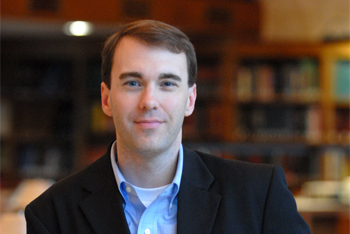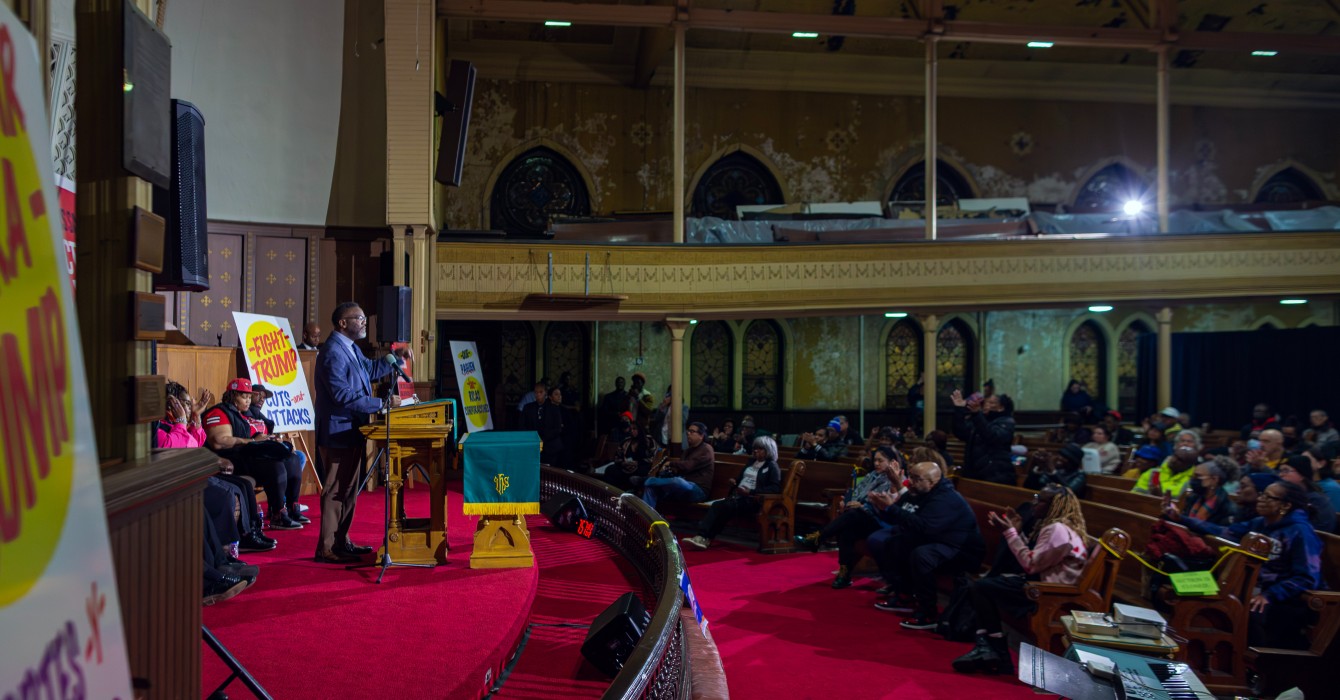Editor’s note: As the Christian landscape changes, leaders must ask and answer a new question: What’s the future of denominations? This interview is part of an occasional series that offers the thoughts of people across American Christianity on this vital issue.
[Updated: In August 2021, Michael Lindsay will become president of Taylor University.)
Although its 19th-century bureaucratic structure is outmoded, the church has the “nimble capability” to adjust to the needs of the 21st century, said Michael Lindsay, a sociologist at Rice University [2006-2011] in Houston, Texas.
Lindsay specializes in issues surrounding leadership, religion and culture. He is the author of several books, most notably “Faith in the Halls of Power,” a study of how evangelicals have made inroads into American politics, popular culture, academia and business. He has recently completed the first phase of the White House Fellows Project, which is the most systematic survey of top American leaders conducted in nearly 40 years.
He spoke to Faith & Leadership about the role of the church in American society and his interviews with national leaders. The following is an edited transcript.
Q: Why is it important for Christian leaders to be interested in the broader culture?
There is a recognition that leaders play a significant role in shaping institutions. I’m less convinced that individual people make a huge difference in changing society. It’s largely done by significant institutions -- government, business and the nonprofit sector. But those institutions can be steered. They change slowly, with lots of institutional inertia that an enterprising leader will face. But leaders can make course adjustments that can have long-term effects.
The church has, in large part, been on the sidelines of shaping society for, let’s say, the last 40 years. It wasn’t always that way, but it has become that way. Particularly among the evangelical Christians that I’ve interviewed, there’s a sense of nostalgia for the past, when their forebears had more cultural influence. There is also a desire not to have to divide their lives so that their faith has to be separate from the kind of influence that they wield in the marketplace. And they want to bring faith-based sensibilities into the organizations that they lead, recognizing that it’s a pluralistic world and that they can’t evangelize in the same way that maybe somebody who was living in 1850 could.
Q: The mainline seems to have lost the entrepreneurial impulse it once had when it founded institutions such as hospitals, colleges and other social benefit organizations. You quote one source in “Faith in the Halls of Power” who says “evangelicals are the new Episcopalians.” Have evangelicals inherited this impulse?
Evangelicals are very much entrepreneurs. That entrepreneurial energy drives a whole range of things, such as starting and developing media ventures, nonprofit organizations and parachurch ministries. They also look for new ways to do business in the church.
Scholars have understood religious organizations as either modalities or sodalities. A modality is like a parish church which serves all the constituents in a particular geographical area. A sodality is more like a Catholic order or a Methodist hospital. It is not all things to all people in a specific locale. Instead, it specializes in things like youth ministry or health care. A modality, like a parish church, doesn't have the freedom to specialize because it serves everyone in a particular area.
The future of religious life in the United States will be a combination of those two. The megachurch does that. You take the skilled specialization of youth ministry, singles ministry, ministry to 20-year-olds, and you combine it with an effort to serve folks who live in the same area.
That’s what I think the future will look like. The entrepreneurial energy that many evangelicals have long brought to bear on evangelism they’re now bringing to social justice causes and wider cultural influence.
Q: Can the mainline imitate or recreate that? Or is it mostly relegated to the sidelines now?
No, I think the mainline is not relegated to the sidelines. The traditional bureaucratic form of religious organization is dying off because most bureaucratic organizations are. Our institutions that are growing are doing things in different ways. So eBay is growing by leaps and bounds; Sears is not.
And it’s because of the way that they understand the relationship with their customers and their relationship with their vendors, and the way that they get their products out to market. The church has that sort of nimble capability.
If you take the long view, the church is a very flexible, durable institution. But if you take a view of, say, the last 200 years, mainline denominations have been the largest endorsers of a traditional, 19th-century bureaucratic model. That doesn’t have much of a future.
Q: What are you learning about raising up leaders from your research on the White House Fellows Project? What does the church have to learn there?
Three things: First, early leadership opportunities are the fastest way to accelerate someone’s leadership potential over the course of their life. The church needs to identify, encourage and support younger leaders in their midst more intentionally and more frequently.
Also, the most competent leaders have two things in spades -- wide interests and a deep reservoir of physical and emotional energy. With wide interests, you can build a relational bridge with just about anyone. Truly great leaders can talk sports with some folks and literature with others. And nothing can serve a leader better than a reservoir of energy.
Third, you don’t know what you can get away with until you try it. White House Fellows are, by and large, risk takers. Maybe not financially, but they take other kinds of risks: learning new things, volunteering to launch a new organization. We need more risk-taking in the church.
Q: How can secular institutions help the church re-envision its own organization and stewardship of power?
Secular institutions do the church a great service by holding up a different model for organizational life. Too often these days, the church mirrors secular modes of operation. Witness the number of pastors who treat “Good to Great” on the same footing as the gospel.
That’s the challenge churches face -- they have to keep one organizational foot in the everyday world of getting things done while keeping the other foot in a realm that cares less about doing and more about being.
Q: I know you’re a sociologist by training, but as a Christian, how do you view power theologically?
Answering that sufficiently requires a lot more time than we have. If I had to sum it up, though, I view power much the same way as I view money. It’s a resource that can be put to godly good, but we have to handle it very carefully and build systems of accountability in our lives to use it rightly. I’m probably more sanguine about the positive uses of power than some other Christians, but I’ve seen how it can be put to good use in many different contexts, so I have cause for hope.
I also know that we are very prone to self-deception, so let’s not fool ourselves. We can quickly go from handling power to being consumed by it. I want to help the church think more clearly about the appropriate uses of power, not only for the gospel but also the common good.
Q: I was struck by your description in “Faith in the Halls of Power” of leaders having “convening power,” the power simply to draw people together. That is a surprisingly elastic or nimble view of power that you’re describing.
Steven Lukes is a social theorist who says that there are three faces of power. The first face is the one that Max Weber defined as the ability to get things done despite opposition: you just force people to do things. The second face of power is the ability to do things by doing nothing. Inaction becomes a form of exercising power. Governors exercise this when they don’t offer a stay of execution, for example. The third face of power is when you convince people that they ought to accept their dominated position so that they take it for granted.
Most of the leaders who I interviewed [for the White House Fellows Project] feel powerless. Many of them say, “I can’t do very much. My board is on me. The shareholders are on me. I’m very circumscribed in the difference I can make.” I would say to the CEO, “You employ 60,000 people. How can you say that?”
Even the presidents of the United States feel this way. Jimmy Carter says, “There were so many limits on me. I was given such a tough situation to endure with the energy crisis and inflation. I was very limited in what I could do.”
I got to thinking that this doesn’t make any sense. These folks have enormous influence, but they don’t see that influence. It’s because we have turned to a model where we at least have to give the impression of participative decision making. It’s not command and control. A hundred years ago, it may have been possible for a college president or a CEO to order a decision from on high and people had to follow it. Today it just does not work that way. We have a sense that people should be empowered from below.
Yet there is something that a leader can do that nobody else can do. It’s the ability to bring disparate constituencies together. To build a new building at your church, you have to be able to work with city planners, councilmen, neighborhood associations, as well as your church members. If you’re going to be a college president, you’re constantly bringing together different groups. Politicians do this, as do leaders in business.
That’s the challenge -- and frankly, the opportunity -- that a leader has. Because of their different contacts and because they are placed at the top of their organization, they are uniquely poised to bring folks together from within their organization and to build connections with people in other organizations and across town. And they do this because it’s what is required if you are going to get things done.
Q: Why is it so powerful when business leaders forswear wealth or go out of their way to get to know poor people because of their faith?
Privilege only becomes a form of witness when it is willingly relinquished. I recently interviewed a very successful business executive who happens to be Mormon. He was asked by his church to resign his position and relocate to another part of the country so that he could lead a mission being staffed by 150 young missionaries. The assignment required him to … agree to remain in that region where he was assigned for the next three years. He and his wife couldn’t leave town even to attend the birth of their grandchildren. The mission required their attention 24 hours a day, seven days a week, for three years.
How many of us would be willing to make a similar sacrifice for our church and our faith? Not many, for sure. That’s why this becomes such a powerful form of witness: because it is costly and rare.
Q: What can mainline leaders learn from evangelicals in the halls of power who have made high-profile mistakes?
Accountability is the surest way to avoid major problems. Nobody falls full-bore into a scandal. We always slip into it in small steps. Every leader needs a circle of friends who can ask the hard questions about our lives: Are we being faithful with our finances, our relationships and our workplace dealings? Have we placed guardrails in our lives to keep from falling into the ditch? These are simple and straightforward kinds of things, but they can play important roles in keeping us from making big mistakes.








